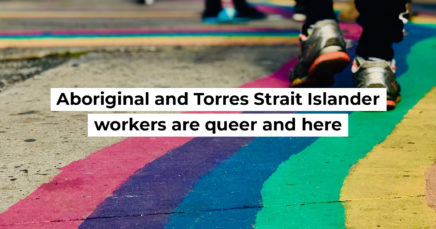The ACTU was there at the start of the land rights movement, supporting the walk-off by Aboriginal stockmen at Wave Hill in August 1966, 50 years ago.
And now, at the end, the ACTU is there again. I say at the end because Wave Hill never made it as an economically viable Aboriginal-run property. In fact, it is hard to find a single Aboriginal venture on Aboriginal land that is viable. Fishing trawlers, cattle, tourism, market gardens, carbon farming and myriad others have almost all failed.
The only employment that has ever been “successful” in remote Aboriginal communities is public sector and “bought” jobs. Many public sector jobs minister to people in need who would not be in need if they had a job. “Bought” jobs are those jobs created for those who would not otherwise find employment. Both types are an admission of failure.
The proof is that the commonwealth has run the Community Development Employment Projects scheme, in various guises, since 1977. It is a paint-rocks-white scheme that makes failure look like success. CDEP came about because of a decision by the Commonwealth Arbitration and Conciliation Commission in 1965, at the behest of the ACTU, to include Aboriginal workers in the Cattle Station Industry (Northern Territory) Award 1951. The decision created widespread unemployment among Aborigines in remote areas of northern Australia. The “solution” to unemployment was to grant Aboriginal people access to unemployment benefits. Unfortunately, when access was granted, the absence of realistic work prospects created a disincentive to work. Aboriginal people were paid to “sit down”.
First came equal wages, then the market sorted out the real worth of many Aboriginal workers and created unemployment. Then came sit-down money. Then came the pooling of unemployment benefits for make-work, which was CDEP. CDEP became known as “stand-up” money. Understand?
As for community development, well, that never happened. Instead came family destruction, the likes of which is reported every other day: crime, child abuse, domestic violence, alcoholism. The Abbott government rebadged CDEP as the Community Development Program. There was an interim program between CDEP and CDP, but it was the same deal, masking the failure to thrive of Aboriginal land rights.
The ACTU wants the CDP dismantled. And it is right to do so. Just as it was right to push for equal wages for Aboriginal workers in the 1960s. But the ACTU is like a stopped watch; it’s right twice (a day) but has no clue what the time is. Equal wages had unintended consequences.
Not every worker was worth his keep. Collective rights to non-tradeable land had unintended consequences. Land is worthless without a productive use. I understand that Aborigines derive a spiritual “income” from the land, but that is a matter for Aborigines, not taxpayers who prop up land rights with make-work schemes.
But the ACTU does not want to abolish CDP because it masks the failure of land rights. It wants more workers’ rights. At the announcement last week of a campaign to remove CDP, ACTU indigenous officer Kara Keys said: “This is a program which discriminates on the basis of race and has no place in a modern society.” On the latter she is so right. But when ACTU secretary Dave Oliver says, “These workers labour without the protection of federal OHS standards or workers’ compensation and earn no superannuation,” he is so wrong.
I have observed many such schemes in many communities, and I can report that there is not a lot of labour involved. This is not work, this is welfare. To pretend that welfare is work is typical of the ACTU. Bugger the unintended consequences, just make sure the “worker” gets his due. In this case, the due is a make-believe job in a non-economy. If the ACTU had its way the entire Australian economy would look like a remote Aboriginal community. No economy, but everyone getting their due and claiming compo.
The ACTU is also campaigning for recognition of Aborigines in the Constitution.
I can tell you now, Dave Oliver, it is not going to happen. It has been 10 years since John Howard promised to consider the proposition and still there is no proposal any government could possibly agree to.
Instead, we keep paying for the new CDEP scheme, and to consult Aborigines about the Constitution, only to be told Aborigines would rather have a treaty. A treaty would be like a mega workers’ compensation scheme forever.
Gary Johns, Brisbane, 25 August, 2016, The Australian



